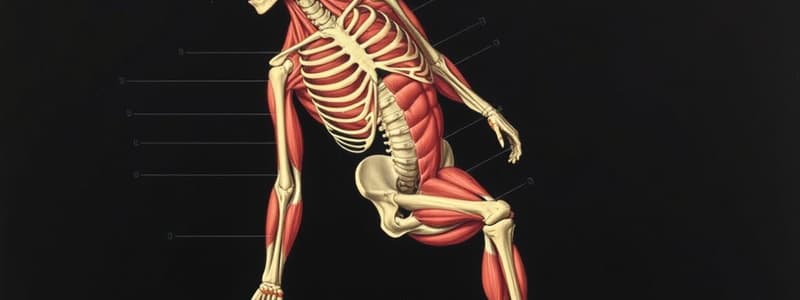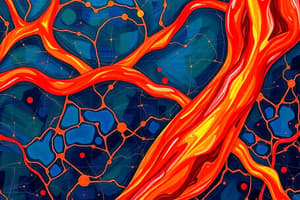Podcast
Questions and Answers
What determines the strength and direction of pull in muscles?
What determines the strength and direction of pull in muscles?
- Length of the muscle
- The muscle belly size
- Arrangement of fascicles (correct)
- Type of muscle fibers
How many categories are muscles grouped into?
How many categories are muscles grouped into?
Five
What are fusiform muscles characterized by?
What are fusiform muscles characterized by?
Central muscle belly that converges to tendons
What is a unipennate muscle?
What is a unipennate muscle?
Match the type of muscle with its description:
Match the type of muscle with its description:
What type of muscle is a biceps brachii classified as?
What type of muscle is a biceps brachii classified as?
What defines orbicular muscles?
What defines orbicular muscles?
What is true about convergent muscles?
What is true about convergent muscles?
Flashcards are hidden until you start studying
Study Notes
Classification of Skeletal Muscle
- Skeletal muscles are classified by the arrangement of their fascicles, impacting strength and direction of pull.
Categories of Muscles
- Five main categories: fusiform, parallel, pennate, orbicular, and convergent muscles.
Fusiform Muscles
- Characterized by a central muscle belly that narrows into tendons at one or both ends.
- One-headed muscle: A fusiform muscle with a single tendon at each end.
- Two-headed muscle: A fusiform muscle with two tendons that merge into one insertion point, exemplified by biceps brachii.
- Three-headed muscle: A fusiform muscle with three tendons merging at one insertion point, such as triceps brachii.
Parallel Muscles
- Formed by fibers lying parallel to one another, can create various shapes:
- Flat muscle: Sheet-like structure of fibers.
- Straight muscle: Long and strap-like, sometimes featuring tendinous intersections.
- Quadrate muscle: Composed of short fibers, square in shape.
- Two-bellied muscle: Interrupted by tendinous intersections, giving it two distinct bellies.
Pennate Muscles
- Muscle fibers attach obliquely to a central tendon, resembling a feather's structure.
- Unipennate muscle: Single tendon with fibers attached on one side.
- Bipennate muscle: Central tendon with fibers attaching on both sides.
- Multipennate muscle: Composed of several tendons with fibers converging toward them, such as in the deltoid muscle.
Orbicular Muscles
- Sphincter-like muscles that surround orifices, providing closure, e.g., muscles around the mouth.
Convergent/Triangular Muscles
- Muscles with fibers originating from a broad area that converge to a single attachment point, allowing for versatile movement.
Studying That Suits You
Use AI to generate personalized quizzes and flashcards to suit your learning preferences.




